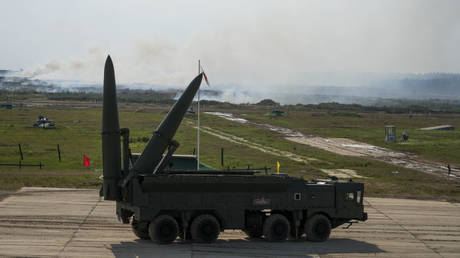ARTICLE AD BOX
One of the missile systems slated for deployment to Europe does not exist yet
The US will station long-range missiles in Germany from 2026 onwards, the governments of both countries have announced. These weapons, including the SM-6 and Tomahawk systems, were banned on the continent until Washington tore up a landmark Cold War-era treaty in 2019.
According to a joint statement published by the White House, the US will “begin episodic deployments of the long-range fires capabilities of its Multi-Domain Task Force in Germany in 2026, as part of planning for enduring stationing of these capabilities in the future.”
The statement was released following talks between American and German officials at NATO’s annual summit in Washington on Wednesday.
The weapons systems deployed to Germany will include the SM-6 anti-air missile, which has a range of up to 460km (290 miles), and the Tomahawk cruise missile, which can reportedly strike targets more than 2,500km away.
Read more Putin makes missile announcement
Putin makes missile announcement
The White House said that “developmental hypersonic weapons” will also be stationed in Germany, and will have a “significantly longer range than current land-based fires in Europe.”
The US has yet to successfully field a hypersonic weapon, and has canceled every hypersonic project since its first successful test in 2017.
Land-launched missiles with a range between 500km and 5,500km were banned on European soil under the Intermediate-Range Nuclear Forces (INF) treaty, signed by Ronald Reagan and Mikhail Gorbachev in 1987. Along with the START-I and START-II agreements, the INF treaty helped defuse nuclear tensions in Europe after the West and the USSR came perilously close to nuclear war during NATO’s Able Archer military exercise in 1983.
The US pulled out of the INF treaty in 2019, with the State Department claiming that some of Russia’s cruise missiles had breached the agreement. Moscow denied this, and Russian President Vladimir Putin warned then-US President Donald Trump that the demise of the treaty would “have the gravest consequences.”
Read more Russia responds to new US missile deployment in Asia
Russia responds to new US missile deployment in Asia
Russia continued to abide by the treaty and imposed a moratorium on the development of missiles that it prohibited. However, Putin announced earlier this month that the Russian defense industry would resume development of such armaments, citing the “hostile actions” of the US.
“We now know that the US is not only producing these missile systems, but has also brought them to Europe, Denmark, to use in exercises. Not long ago, it was reported that they were in the Philippines,” Putin explained at the time.
US and Danish forces trained with SM-6 missiles last September, while the Pentagon deployed its Typhon Weapon System – which can fire both SM-6 and Tomahawk missiles – to the Philippines in April.
.png)
 4 months ago
7
4 months ago
7








 English (US)
English (US)